American View
Feature
As Refugee Crises Intensify, Jews Aid in U.S. Resettlement
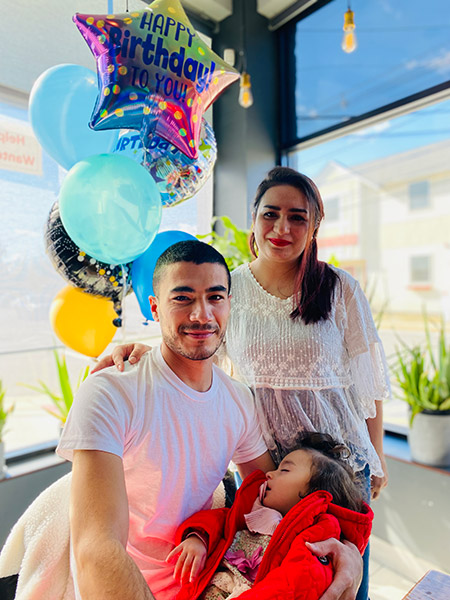
Photo by Rahel Musleah.
Twenty-one-month old Elisa, a refugee from Afghanistan who arrived in the United States in November with her parents, is already calling her new Jewish neighbors “auntie” and “uncle.”
On a recent March morning, exactly a month after Elisa’s family moved to the second floor of a blue-sided two-family house in suburban New Jersey, two of those aunties, Shayna Schmidt of South Orange and Liba Beyer of Maplewood—both leaders of a local Jewish effort to resettle the family—visited the young couple, Dina and Ali, and their daughter. Schmidt whisked the toddler away to read and play on the pink shag rug of her new room. Elisa sat in her lap, clutching a Doc McStuffins toy. Nearby in her parents’ bedroom, a pillow set against a patterned ivory bedspread declared House + Love = Home.
Dina, a 27-year-old matrimonial lawyer from Kabul, graciously extended her hospitality, bringing out a tray of cashews, pistachios, dates, crescent cookies and cups of cardamom tea. Beyer, whose day job is director of Global Campaigns for Human Rights Watch, chatted with Ali, who had worked for the American Embassy as a forklift driver until the Taliban took over in August 2021, turning their lives upside down.
“We weren’t able to bring anything with us,” Dina said in Dari, the form of Farsi spoken in Afghanistan, through an interpreter. “Just some backpacks with a couple of changes of clothing and a small Koran. The rest was milk and diapers and stuff I needed for my little daughter.” The Taliban had shut both Dina’s office and her mother’s hair salon and, like other Afghans who have fled, Dina fears for the safety of her and Ali’s relatives, most of whom remain in Afghanistan. To protect them, Dina and Ali are not sharing their last name.
And in a nod to their new lives in a new country, they have decided to call Elisa by her middle name instead of her given first name, Fatima.
“It was very difficult to leave the country you’ve spent your entire life in, to leave your family,” said Ali, 28. “I still tear up and get mad about how much I’m missing home.” Dina and Ali are Shiite Muslims, and while Ali noted that he had met Jews at the embassy where he had worked, he said that “something like this, where people would sit together, break bread, share a meal and talk—that didn’t happen before.” Religion is not a factor in determining whether a person is good or bad, he added. “For me and my family, what matters is humanity.”
The plight of refugees is more poignant than ever today as scenes of devastation and despair from Ukraine rivet world attention. The crisis continues as Jews prepare to celebrate the holiday of Shavuot, which begins this year the evening of June 4 and models the Jewish responsibility of welcoming strangers, such as the biblical Ruth, into our midst. The United Nations reports that more than 6.5 million people have fled Ukraine and more than 7 million have become internally displaced since the Russian invasion began in late February. President Joseph Biden has announced that up to 100,000 refugees from Ukraine will be welcomed in the United States.
Synagogues and other Jewish groups across the country have historically mobilized resources to help refugees, from Vietnamese in the 1970s to Soviet Jews through the 1990s to Syrian refugees from 2014 to 2016. What was different with the initial phase of the Afghan resettlement was the sheer volume of Afghans already in the United States and in need of welcome into communities, said Merrill Zack, vice president of community engagement for HIAS, the 100-year-old agency originally founded as the Hebrew Immigrant Aid Society, the only Jewish agency that works with the American government to implement the refugee admissions program. Zack cited the 76,000 refugees evacuated since last August in phase one of Operation Allies Welcome who had spent months on military bases in the United States. Of those refugees, 3,500 have been resettled through HIAS, which primarily works with local synagogues and Jewish organizations.
Schmidt and Beyer, both Hadassah life members, are more than just kind neighbors. They sit on the six-person steering committee of the SOMA Welcome Circle, an initiative that operates under the aegis of HIAS and involves three New Jersey synagogues in the South Orange-Maplewood area, known as SOMA—Temple Sharey Tefilo-Israel, Beth El Congregation and Congregation Oheb Shalom.
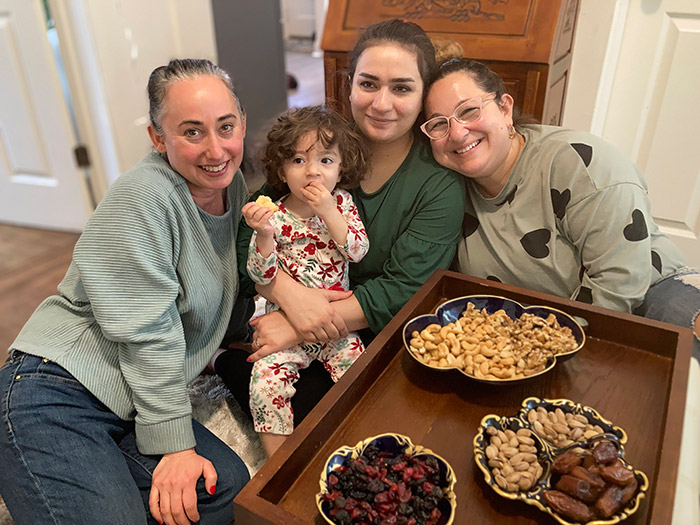
with Dina and her daughter, Elisa. Photo by Rahel Musleah.
“We keep telling our Afghan family that we are all immigrants,” said Beyer, who was a Young Judaean in her youth.
No specific plans to welcome a Ukrainian family have been implemented, according to Schmidt, but “we are all in the mind to help whomever we can and to continue to resettle families as they come to our area.”
The United States refugee resettlement program works like a pyramid of services. At the top, the State Department contracts with nine national umbrella agencies, including HIAS, which then partner with local groups such as Jewish Family Services to perform the tangible, nitty gritty work. In a recent development, in October 2021, the Biden administration authorized emergency nationwide “sponsor circle” programs—HIAS calls such programs Welcome Circles—to facilitate the absorption of Afghan refugees. The sponsor circle initiative allows private citizens and communities to be directly involved in refugee resettlement for the first time in decades. Sponsor circles take on responsibilities traditionally delegated by the umbrella agencies to local agencies. The program is now being adapted for refugees from Ukraine.
“The innovation of sponsor circles is the willingness of our country in this emergency moment to trust community members to welcome the refugees,” said Zack. “In response, circle members are saying, ‘We will rise to the occasion as American citizens and as Jews.’ ”
Every item in Dina and Ali’s home, from kitchen utensils to electronics, has either been donated or purchased by members and friends of the three synagogues. The community received over 980 material donations, exceeded their fundraising goal of $50,000 and determined that it would commit to supporting the family for a year, rather than HIAS’s standard requirement of six months of assistance. Schmidt, a realtor who found the apartment, coordinates transportation for the family. Other members shared their medical, legal and professional expertise at no charge and signed up for a meal train. Local businesses offered free haircuts, photo shoots, moving services and more.
“Coming together as a community to help people is always part of being Jewish,” said Susannah Litwin, 14, one of six eighth graders in the SOMA area who raised $1,008 by baking and selling homemade cupcakes, cookies and brownies. “I hope our donation allows them to have a brighter future,” added fellow baker Scarlett Friedland, 13.
Over 100 sponsor circles have been established around the country, welcoming more than 350 Afghan individuals. Of that number, 32 are HIAS-affiliated Welcome Circles, which crisscross the country from Palo Alto, Calif., to Poughkeepsie, N.Y. The numbers include 13 circles in California, eight in the Northeast and several in the Midwest. Like the SOMA circle in New Jersey, the others have responded with an outpouring of goodwill, compassion and tangible donations. All Afghans who arrived in the United States since last summer have been resettled, and more circles are being recruited in preparation for Afghan families currently overseas on American military bases and other places.
In addition to completing rigorous background checks and paperwork in order to be certified, Welcome Circle members attend workshops and trainings on subjects such as cultural understanding, navigating boundaries and building trust as well as webinars on practical issues like budgets and finances. The goal is to lead the families to independence and employment.
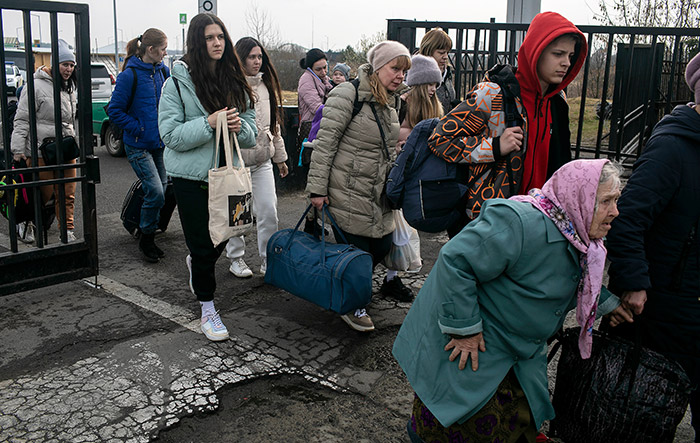
On May 23, on a video call with 600 participants who dialed in from Jewish communities nationwide, HIAS announced the launch of its Welcome Circle program for Ukrainian refugees. “There is a considerable amount of interest and commitment, including from several Afghan Welcome Circles,” said Zack. In addition, the refugee resettlement program under the Lautenberg Amendment, which was first enacted in 1990 to facilitate resettlement of Jews from the former Soviet Union, has been reauthorized in response to the war in Ukraine. Lautenberg eligibility is limited to members of specific religious minorities that claim persecution, as designated by Congress, with close family members who hold permanent immigration status in the United States. On the ground, a HIAS response team has been in Poland and Ukraine assessing ways it can assist both Jews and others as they cross into Poland and other neighboring countries.
In St. Louis, Mo., the HIAS-affiliated Intertwine Interfaith Welcome Circle is the outcome of a six-year collaboration among Congregation Shaare Emeth, Parkway United Church of Christ and the Turkish American Society of Missouri (TASOM). Forming the circle was a natural progression, said Debbie Bram, Shaare Emeth’s director of Jewish life and learning.
“Many TASOM members emigrated themselves and had a challenging time being accepted, especially after 9/11,” she said. “One of the core reasons that the Intertwine program was created was to build bridges. And so now to do this together, to welcome new refugees, is making that bridge even stronger.”
The Intertwine circle greeted a family of six in February—parents and four children aged 3 to 11. The mother, a midwife and doctor, worked with United States Special Forces in Afghanistan and was involved in Covid-19 treatment there. The father is a nurse who worked for an international medical group by driving women to work, since women do not traditionally drive in Afghanistan. The couple is hoping to obtain medical licensing here, a process that could take two years.
Members of the St. Louis circle are experiencing a learning curve covering everything from food to language, Lisa Mason, a congregant of Parkway United Church of Christ, said in a post on the church’s website. “A family of six can eat an incredible amount of naan in a day since it’s used as a ‘spoon’ at every meal; there are even more varieties of rice than we knew, and everyone loves pizza.” The word “camp” triggers traumatic memories of the family’s months in United States military camps in Qatar and New Jersey, she added, so the phrase “summer program” is substituted for “summer camp.”
Back in New Jersey, Rabbi Daniel Cohen of South Orange’s Temple Sharey Tefilo-Israel noted that “The Torah mentions welcoming the stranger over 36 times, and frequently adds ‘because you were slaves in Egypt.’ It’s clear that those who know the pain of being powerless, and have suffered as a result, have a responsibility to help and uplift others once they are in a position to do so. We consciously wanted to do this work as a synagogue community.”
The SOMA group previously welcomed Soviet Jews and, five years ago, two Syrian and one Iraqi family. One of the Syrian daughters now teaches in Temple Sharey Tefilo-Israel’s preschool. Cohen said he has a personal obligation, too. His grandfather escaped Lithuania in the early 1900s. “No one helped him then. For his grandchild to be in a position to help is really powerful.”
The SOMA community has surrounded Dina and Ali like a large Jewish family, said Beyer, but their efforts can only partially mitigate the hard work ahead.
“Whatever you’ve done in the past, you have to start over to build a life again,” said Dina, who dreams of returning to work as a lawyer or paralegal. Ali, who was on the Afghan National Handball team, hopes to obtain a commercial driver’s license (one of the rabbis donated a car) and work as a driver while he studies to become a fitness instructor.
Though most welcome Circles are formed by Conservative and Reform synagogues, Kehilat Kesher, the Community Synagogue of Tenafly and Englewood, N.J., is Modern Orthodox. Its members welcomed Nik Muhammad, his wife, Hanifa, and their 3-year-old son, Mudaser, in February. In addition to funds raised to sustain the Afghan family for six months, one donor offered to let the family stay in the carriage house on his property for two weeks until a more permanent apartment became available.
Besides the mitzvah of tikkun olam, Leah Silberstein, who sits on the steering committee for the shul’s Welcome Circle, said her background as the child of Holocaust survivors helped by HIAS drives her to aid refugees.
“It takes extraordinary courage to leave everything you know behind and to find one’s footing in a society that’s utterly foreign to you—professionally, personally, spiritually and socially,” said Silberstein, 60, a Hadassah life member and director of strategic initiatives for a private school in Manhattan. In some ways, the Afghan family she is assisting reminds her of her parents’ immigration story. They came to these shores holding the hands of a 3-year-old child—her older sister, who was born in a displaced persons’ camp in 1948.
“It’s a humbling learning experience for me to see the world from someone else’s eyes,” said Silberstein. “It has reinforced my awe and respect for what my parents did without bitterness or an ounce of hatred.”
Nik Muhammad, who worked in Afghanistan as a translator for United States governmental advisers for five years, has a degree in English literature and education from Balkh University. His family’s airy apartment in northern New Jersey looks out over a busy downtown street and a twice-weekly flea market. The town has a sizable Muslim refugee population, a mosque and halal grocery. “The apartment is openhearted,” he said. “You don’t feel like you’re living in a prison or jail.”
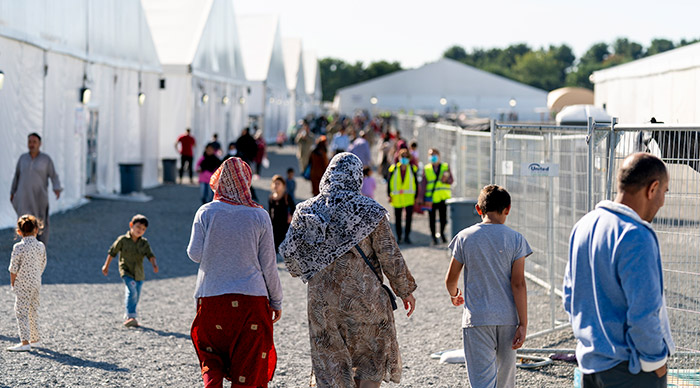
Like Dina and Ali, Nik Muhammad said that he and Hanifa, a seamstress, delayed their departure from Afghanistan until the fall because of the huge crowds that besieged the airports in August. After leaving on a special immigrant visa for people who worked for the United States government or its affiliates, he spent almost a month on a military base in Qatar before arriving at Fort Dix, near Trenton, N.J. The young family lived in a one-room military barracks for almost two months, still wearing traditional Afghan clothing called koli—among the few items they brought with them—Mudaser in a gray tunic and wide pants, Hanifa in brown and he in black. Now, the family has donned Western clothes, including an Incredible Hulk T-shirt for Mudaser. Meanwhile, their families and most of Nik Muhammad’s 24 colleagues who served as translators have not been able to leave Afghanistan.
“Sometimes when we have a video call with my parents, Mudaser shouts, ‘Darzimah, darzimah!’ I’m coming, I’m coming, in Pashto,” Nik Muhammad said. “Or, ‘Roza, roza!’ You guys must come here. The only English words he knows are ‘thank you,’ because he hears me saying it to other people.
“I haven’t been in this situation before,” he continued. “I stood on my own feet and spent my own money. Now sometimes I shy to ask, ‘Please take me to the grocery store.’ I feel awkward. People who are independent and now dependent on other people, it’s very hard for them.”
He said he hopes to work as an internet technician for a cable company, or if he is able to afford a car in the future, as an Uber, Grubhub or Amazon driver. Now that he has his Green Card, he said, “the U.S. will be like our homeland. We will work hard to make this homeland better and better by our hard working. It doesn’t matter if I have a low job or a higher position. I can help this country.”
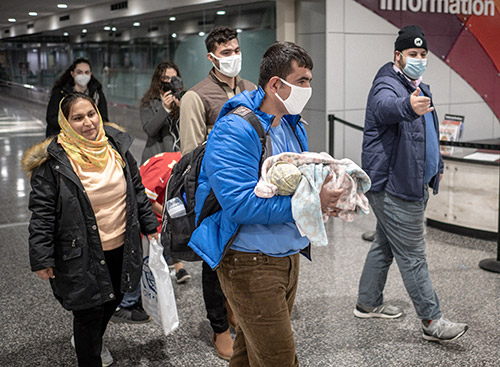
family to Tulsa, Okla. Image courtesy of Congregation B’nai Emunah.
Congregation B’nai Emunah, a Conservative synagogue in Tulsa, Okla., has taken support of refugees one giant step further than most other Jewish communities engaged in this work. Last October, they became a federally funded local resettlement agency. Though a suggested number of refugees for an agency to assist in its full first year is 50, B’nai Emunah resettled 59 Afghans in its first three months, said Rabbi Daniel Kaiman. A professional director of refugee resettlement, two caseworkers, an administrator and a part-time translator now work out of the synagogue’s library. A nearby warehouse stores donated furniture and other goods and is the site of tikkun olam in action, including religious school children who have assembled welcome kits there.
Founded 100 years ago by refugees from Latvia, B’nai Emunah, with around 500 member units, has long been committed to social justice, a commitment that is now guided by co-rabbis Kaiman and Marc Fitzerman. Six years ago, the congregation established the only free English as a second language program in Tulsa that offers childcare for local refugee mothers, who are mostly Burmese, Russian and Ukrainian.
That project opened the door to more resettlement work, and the Afghan crisis unfolded while the community was becoming certified as its own agency, said Kaiman, 37, a Hadassah Associate whose maternal grandfather is a Holocaust survivor. His Cuban-born mother immigrated to Israel and then to the United States. Currently, there are around 150 Ukrainian families in the area, and Kaiman said that while his synagogue awaits further guidance in resettling refugees from Ukraine, it has been working with some of these local families to file applications on behalf of relatives who might qualify as refugees under the Lautenberg Amendment.
The synagogue encourages members to rent to refugees and employ them, to volunteer and donate time and funds. For some members, Kaiman noted, refugee work is a way of expressing their Judaism.
“We probably have more Jews regularly volunteering with our resettlement services than coming to Shabbat morning services,” he said. “Almost every time we face a challenge or question, there’s a congregant excitedly and surprisingly on the other end of the phone.”
“So often when you do social service, you do it through someone,” Kaiman added. “In this case, we are the ones doing the work, and it feels like an extension of the congregation. It’s another level of investment and care, and models for our kids the values that are near and dear.”
During recess from religious school on a recent Sunday morning, students played on slides, rode bikes and climbed on playground equipment side by side with four Afghan children whose parents were meeting inside the synagogue with their lawyer—a B’nai Emunah member with two children in the school.
“Everyone now realizes that we’re living our lives together,” said Kaiman. “There’s great meaning in sharing the journey.”
Rahel Musleah leads virtual tours of Jewish India and other cultural events and has scheduled her first post-pandemic, in-person tour for November 2022 (explorejewishindia.com).










 Facebook
Facebook Instagram
Instagram Twitter
Twitter
[…] * To learn more about the growing Congolese refugee community in Columbus, click here.** To learn more about the HIAS Community Catalyst program, click here. […]